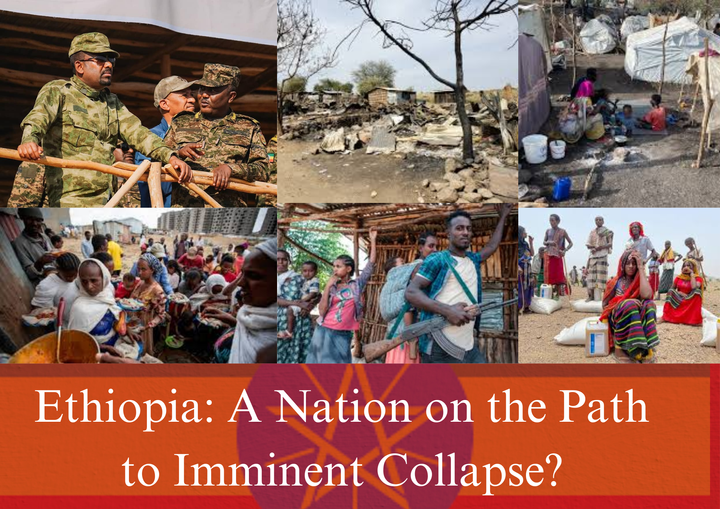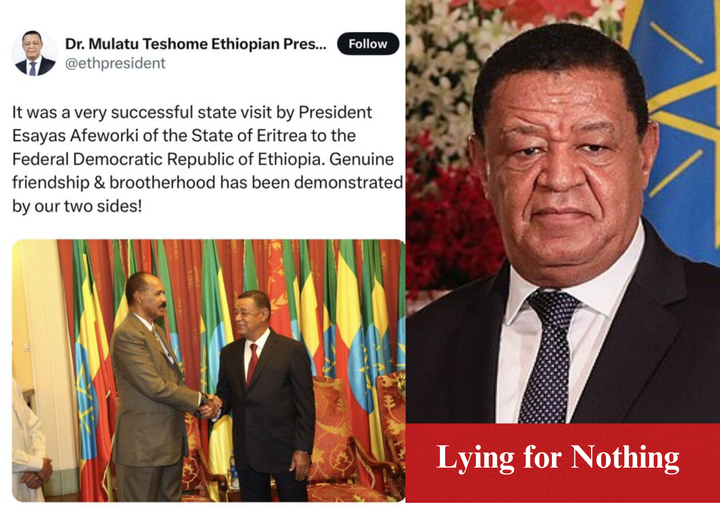President Isaias Afwerki Discusses Sudanese Solution to Sudan’s Problems in an Exclusive Interview
In an interview with ERiTV, President Isaias Afwerki of Eritrea shared his views on the situation in Sudan, with a military coup that has sparked protests and violence.

Summarized by Amanuel Biedemariam
Introduction: For generations, the people of Eritrea have shared a strong bond with their Sudanese neighbors. During the fight for independence, Eritreans found a home in Sudan, not as refugees but as part of the family.
In his address, President discussed the topic of refugees in the Horn of Africa, and his approach, which could reshape how migration is perceived and treated in the region. During his interview on Sudan’s problems, he highlighted Eritrea's approach.
President Isais discussed the political developments in Sudan and their impact. He divided them into three phases: 1956 to 1983, 1989 to 2019, and 2019 to the current state of affairs.
He discussed solutions, the role of IGAD, refugees, and Eritrea’s involvement in helping to restore the people's role in a new system.
The History of Sudan and Its Impact on the Current Crisis:
President Isais stated that Sudan was a highly developed nation until the political Islam movement took over, causing Sudan's economy to tank and become heavily indebted.
The National Islamic Front (NIF) was a political party in Sudan that came to power after years of power struggle in 1989 through a military coup.
The National Islamic Front (NIF). The party, led by Hassan al-Turabi, implemented a radical Islamist agenda. It also supported extremist groups throughout the Middle East and Africa, including Al-Qaeda, which operated training camps in Sudan. Their goals included Islamizing the area and the world in line with their worldview and interfering in other countries internal affairs, exacerbating the country's economic and political instability. Overall, the NIF played a destructive role in Sudan's history, promoting extremist ideologies and supporting terrorism with devastating consequences for the country and the region.
To gain a comprehensive understanding of the conflict in Sudan that began in 2019, it is vital to investigate the underlying causes rather than just focusing on strategic interests since the implications of this unrest stretch further than the Red Sea area, so it is necessary to examine the fundamental matters involved and devise a plan to solve them.
The NIF regime's agenda of Political Islam in 1989 triggered a shift in Sudan's domestic progress. This policy also caused the country to become a focal point of regional disruption.
As a result, from 1989 to 2011, Sudan experienced a breakdown which led to the separation of South Sudan. The South Sudanese struggle was an effort to secure the right to self-determination for South Sudan. The movement's main goal was unity, with Garang believing unity was the key to a successful Sudan.
Despite most people wanting to maintain a united country, Omar al-Bashir's led NIF party's decision to grant South Sudan independence was a big mistake. It occurred while ignoring the other regions, such as Darfur, Kordufan, and Blue Nile. There were unaddressed problems like Abiye and the NDA. This led to significant unrest and sparked a popular uprising worsening the circumstances. Sudan's economy was heavily damaged, resulting in significant debt. And after 30 years of unfavorable policies and difficulties, the public decided it was time for a change, revolted, and successfully set the stage to transition to a new System.
Today, however, it is clear that the conflict's original objective has changed. Some individuals are attempting to take credit for the struggle to control power. Even though they contributed, no one person can take credit for a people's revolution.
Furthermore, creating a divide between citizens and the military is counterproductive. Instead, the emphasis should be on how the populace may take advantage of the shift to establish a new system. So they must stop the power struggle and cooperate to ensure a successful transition.
The military is crucial in Sudan's transition and must not get caught up in power struggles.
Eritrea decided to work directly with Al Burhan, believing he was the best person to lead Sudan toward a peaceful government transition. Eritrea also emphasized the importance of a national army that any specific organization, region, or power doesn't influence.
President Isaias pondered what is the reason behind the power struggle. He asked what is the cause of the power struggle between the two and why it had to come to a head, despite it being preventable. He also stated that the current situation reflects how long-term negligence can culminate in such contentious disputes.
According to his argument, the current development is a "distortion, " We need to understand the issue's background to solve it. He further noted that the current analysis by parties with self-interest in the conflict had worsened the distortion. So we need to return to the basics, the Sudanese people must be empowered to find a solution, and we should strive for a balance since the conflict will affect neighboring nations.
What is Eritrea’s Role, and What should it be?
It is our duty, not an option, to be involved in Sudan. We share a common interest in promoting peace and stability in Sudan and have the capacity and the will to contribute positively.
Even if we enjoy internal stability, we cannot afford to be indifferent or isolated, as we also need regional stability. After 30 years of turmoil, we want to see a successful transition in Sudan, and we are attentive to the issues that can play a constructive role in this process. We are committed to ensuring that the transition in Sudan is successful.
The Sudanese military has always been on the side of the people, and we see ourselves as partners in this process, not passive observers. We recognize that it will take time, but we are patient and committed to working together to achieve our goals. We have developed a proven approach to engaging with Sudan based on finding people-based solutions that respect the national identity and aspirations of the Sudanese people.
We are guided by the principle of Sudanese ownership of the peace process and are committed to working with the support of IGAD and in light of Sudan's history and prospects of nation-building.
Our approach is not in competition with others, as we recognize our unique relationship with Sudan and understand our role well. We do not seek publicity or praise for our efforts but act promptly and appropriately.
We work diligently to prevent conflict and have engaged with Sudan accordingly. We have nothing to regret, and our engagement is unwavering under any circumstances. Sudan is unique to us and holds a special place in our hearts as Eritreans. Whatever we do with Sudan, we want it to be lasting and successful. We are fully dedicated to this end, and our engagement with Sudan is continuous and unwavering.
What is the Region’s Role?
Every nation can be self-sufficient and exist independently from the region. However, the need for regional integration must be addressed, and it is essential to establish an integrated platform for us to thrive. For example, had we worked together and cooperated to address the issues in Somalia, the outcome could have been different.
The goal of IGAD since 1991 has been to promote collective growth and progress, shifting from dependency to self-sufficiency in our joint endeavors. We must continue to strive towards this goal, exercising our collective power without allowing ourselves to be used as a tool for exploitation. We must engage regularly with the region to build our own experiences and ensure that regional issues are determined by the region's people, not by external forces.
Eritrea was compelled to freeze its role in Igad in 2006 after the invasion of Somalia, which changed the role of the regional organization.
How is Eritrea handling the issues of refugees, including Eritrean returnees?
We must know our policies to understand our approach to current developments better. Our air, land, and sea corridors remain open, and we refrain from spreading propaganda about the number of refugees.
We reject any effort to capitalize on the misery and displacement of others. Despite our limited resources, we are committed to accommodating Sudanese nationals as they enter Eritrea. We will open our homes to them, share bread and provide hospitality. We see Sudanese people as our own, and we have always considered each other family. We will never treat them as refugees because Eritrea is their home.
Conclusion: President Isaias Afwerki is the best person to speak on Sudan-related matters. During an exclusive interview, he shared his unique perspective on the ongoing conflict in Sudan. He emphasized the importance of a people-based solution that respects the national identity and aspirations of the Sudanese people. The President also stressed the significance of regional integration and cooperation, which are essential for collective growth and progress. Furthermore, he shed light on Eritrea's role in the refugee crisis, reassuring its commitment to accommodating Sudanese nationals as they enter the country. President Isais's insights provide a fresh perspective on Sudan's problems and offer a viable path toward a successful and lasting solution.



Comments ()